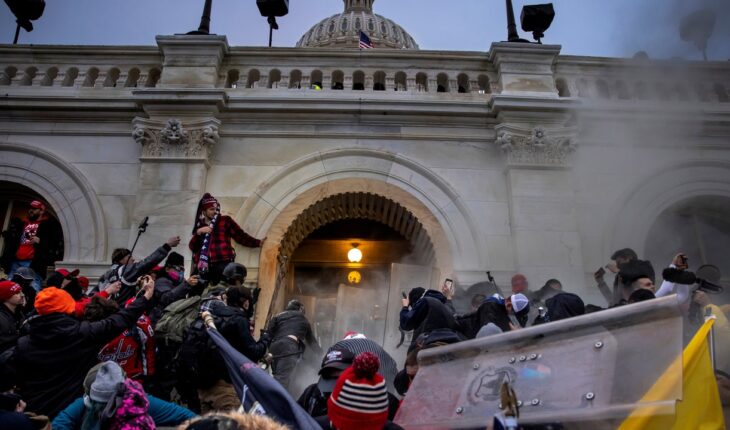When a mob of MAGA faithful stormed the Capitol on January 6, 2021, stalking the halls with weapons and calling for the execution of then Vice President Mike Pence, it seemed like a denouement—the fitting final act of a president who would leave office like the pariah he’d entered it as. But four years later, as lawmakers meet to certify Donald Trump’s reelection, the attack feels more like a prologue than an epilogue.
Trump, constrained in his first term by more establishment figures and done in politically by a pandemic that threw his unfitness into stark relief, has roared back into power. He did not win through the violence of January 6, much of which Americans witnessed with their own eyes. No, Trump won via popular referendum, because the majority of the voting public didn’t see the indelible stain of that day of it as a dealbreaker.
That reflects poorly on the country—and on a Democratic Party so lacking in imagination that it somehow couldn’t envision losing to a convicted felon who already beat them once. But it also speaks to the relentless MAGA messaging around the Capitol attack: Trump and his allies have spent four years trying to rewrite the history of the January 6 insurrection, and with his inauguration two weeks away, it’s clear that to some extent they have. “The American people,” Trump spokeswoman Karoline Leavitt told the New York Times Sunday, “did not fall for the Left’s fear mongering over January 6th.”
It wasn’t fearmongering, of course—and outrage over that day was hardly confined to “the Left.” While 147 Capitol Hill Republicans would still vote against the certification of Joe Biden’s win, many other Republicans expressed frustration with Trump. Some even did so publicly. “Count me out,” the loyalist Lindsey Graham said on the Senate floor, criticizing Trump’s effort to have Congress challenge the Electoral College results. “Enough is enough.”
Corporations wanted to be counted out, too: Big business briefly turned a cold shoulder to the GOP, and for good reason: Most Americans in polls held Trump responsible for the Capitol attack, and more than half in a Pew poll said it would be better for the country if he were removed and replaced with Pence for the remainder of the term. Trump, it seemed, was at his lowest point politically. But the GOP, including some of the same lawmakers who could appreciate Trump’s culpability, once again ran cover: Mitch McConnell, who said that Trump was “practically and morally responsible” for the insurrection during Trump’s second impeachment, wouldn’t go on vote to convict, because he believed Trump was “constitutionally not eligible for conviction” after leaving office.
And so Trump entered Biden’s term in a kind of soft exile down in Mar-a-Lago, where began rebuilding his 2024 viability. Trump recasted January 6 as a “day of love.” Those who rioted in his name were not insurrectionists, he said, but martyrs who were being held “hostage” by Democrats. “They’ve suffered enough,” he claimed at one campaign stop.
Meanwhile, Biden, who had promised to turn the page on Trump’s nascent authoritarianism, made January 6 his own rallying cry as he ran for reelection: “It was on that day that we nearly lost America—lost it all,” he said in remarks near Valley Forge last year, commemorating the third anniversary of the Capitol attack. “Today, we’re here to answer the most important of questions: Is democracy still America’s sacred cause?”
But that question would be filtered through the country’s deep polarization, and banked in its short political memory. And while Democrats warned the public about Trump’s attempts at revisionism—that he was “trying to steal history the same way he tried to steal an election,” as Biden said—the party appeared to take for granted the prospect that simply muddying the waters could be enough for Trump to come out victorious. “If you can bring it to a draw,” as a Trump adviser said last year at this time, “it’s a win.”
Trump would, indeed, win—both the presidency and, by extension, the narrative around January 6, which he’ll now be able to whitewash from the bully pulpit. He is set to pardon the convicted foot soldiers in his assault on democracy. His congressional allies—many of whom enabled or participated in Trump’s election subversion efforts—are eager to use their power to target the January 6 committee and some of its most prominent investigators, including former number three Republican Liz Cheney, who served as its ranking member and is now one of the foremost conservative Trump critics. And a man who spent his first term pushing the boundaries of his power will now be emboldened to go even further—not only because the Supreme Court dramatically expanded executive authority in a ruling related to the federal January 6 case this summer, but because a majority of the voting public gave him its stamp of approval this fall.
He may not enjoy the broad mandate he claims he got in November. But the fact is that a man who openly defied democracy was elected, definitively, through the very democratic process he attacked.
That in no way changes the reality of what happened on this day four years ago. But it may alter the symbolism of it: Before November, it represented the resilience of democracy in the face of an imperious incursion against it. Now, those institutions appear more vulnerable than ever—brought to the brink not by mob violence, but by a demagogue who now has an opportunity to erode the system from within.





